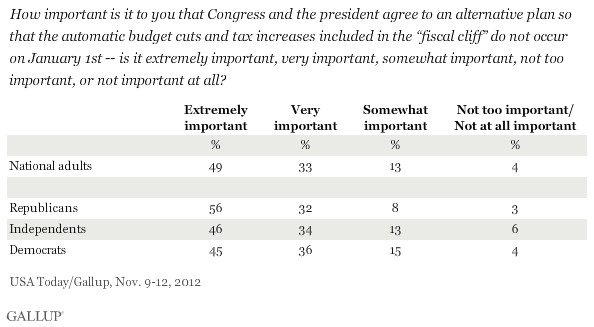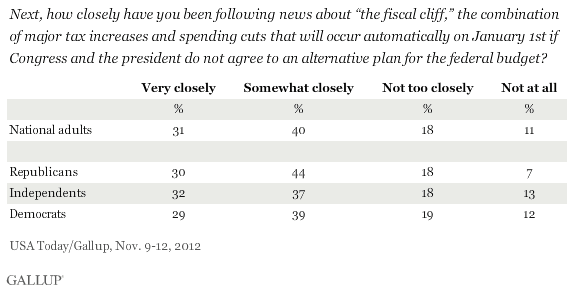PRINCETON, NJ -- More than eight in 10 Americans say it is extremely or very important for Congress and President Obama to agree on a plan so that the automatic budget cuts and tax increases of the "fiscal cliff" do not occur on Jan. 1.

Republicans are slightly more likely than either independents or Democrats to say it is important that the fiscal cliff be avoided, although large majorities of all groups hold this belief.
These results are from a Nov. 9-12 USA Today/Gallup poll. Now that the presidential election is over, more attention is being focused on the implications of the pending Jan. 1 fiscal cliff -- which will occur if Congress and the president do not agree to an alternative plan.
Americans Want Both Sides to Compromise, but Have Little Faith They Will
The strong ideological breach between President Obama and the Democratically controlled Senate, on the one hand, and the Republican-controlled House, on the other, make negotiations on an alternative to the fiscal cliff difficult. Americans of all partisan orientations, however, appear to believe that both sides in the negotiations should compromise in order to reach a solution.
![In the negotiations between House Republicans on the one side and President Obama and Senate Democrats on the other side, what do you think would be the best outcome for the country -- [ROTATED: Republicans compromise more than Obama and the Democrats, Obama and the Democrats compromise more than the Republicans] -- both sides compromise equally, or neither side compromises and the fiscal cliff’s budget and tax increases take effect?](http://content.gallup.com/origin/gallupinc/GallupSpaces/Production/Cms/POLL/en2_mxzcq0kqmth5jft75q.gif)
Although about a quarter of both Republicans and Democrats say it would be best for the country if the other side compromised more, two-thirds of both groups say both sides should compromise equally. In short, rank-and-file Republicans and Democrats across the country are to a significant degree willing to forfeit philosophical purity in order to avoid the fiscal cliff.
In contrast, Americans have quite mixed views regarding how likely it is that both sides will comprise. About a quarter predict that both sides will compromise equally, while 34% say neither side will compromise, with the rest about evenly split between saying Republicans or Democrats will compromise more.
![Just your best guess, what is most likely to happen in the negotiations about the fiscal cliff -- [ROTATED: Republicans compromise more than Obama and the Democrats, Obama and the Democrats compromise more than the Republicans] -- both sides compromise equally, or neither side compromises and the fiscal cliff’s budget and tax increases take effect?](http://content.gallup.com/origin/gallupinc/GallupSpaces/Production/Cms/POLL/bx1319rlf0un_rf1xrtzia.gif)
Americans Following News of Fiscal Cliff Closely
Seventy-one percent of Americans are following the news of the fiscal cliff very or somewhat closely -- 10 points higher than the average attention given to news stories Gallup has measured in the past several decades. There are only small differences in the attention being paid to the news story between Republicans and Democrats.

Bottom Line
Most Americans view finding an alternative plan for the pending Jan. 1 fiscal cliff as either extremely or very important, and want the president and members of the Senate and the House to compromise in order to find a solution.
Survey Methods
Results for this USA Today/Gallup poll are based on telephone interviews conducted Nov. 9-12, 2012, with a random sample of 1,009 adults, aged 18 and older, living in all 50 U.S. states and the District of Columbia.
For results based on the total sample of national adults, one can say with 95% confidence that the maximum margin of sampling error is ±3 percentage points.
Interviews are conducted with respondents on landline telephones and cellular phones, with interviews conducted in Spanish for respondents who are primarily Spanish-speaking. Each sample includes a minimum quota of 400 cellphone respondents and 600 landline respondents per 1,000 national adults, with additional minimum quotas among landline respondents by region. Landline telephone numbers are chosen at random among listed telephone numbers. Cellphone numbers are selected using random-digit-dial methods. Landline respondents are chosen at random within each household on the basis of which member had the most recent birthday.
Samples are weighted by gender, age, race, Hispanic ethnicity, education, region, adults in the household, and phone status (cellphone only/landline only/both, cellphone mostly, and having an unlisted landline number). Demographic weighting targets are based on the March 2011 Current Population Survey figures for the aged 18 and older non-institutionalized population living in U.S. telephone households. All reported margins of sampling error include the computed design effects for weighting and sample design.
In addition to sampling error, question wording and practical difficulties in conducting surveys can introduce error or bias into the findings of public opinion polls.
View methodology, full question results, and trend data.
For more details on Gallup's polling methodology, visit www.gallup.com.
